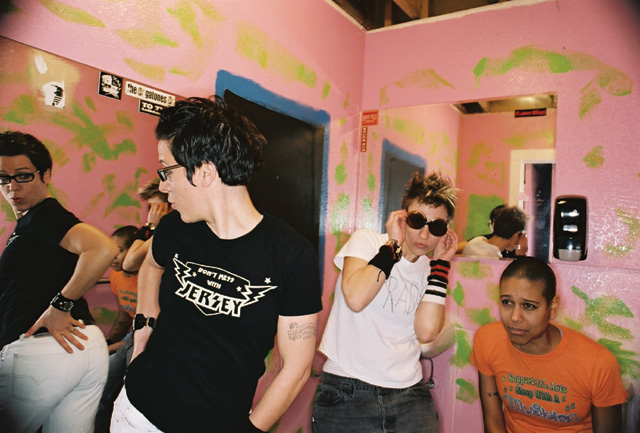apropos de mini-documentarul despre femei in punk numit “typical girls” [partea 1, partea 2, partea 3], doua piese clasice – si versurile:
- the slits: “typical girls” (cut, 1979)
Don’t create
Don’t rebel
Have intuition
Can’t decideTypical girls get upset too quickly
Typical girls can’t control themselves
Typical girls are so confusing
Typical girls – you can always tell
Typical girls don’t think too clearly
Typical girls are unpredictable
PredictableTypical girls try to be
Typical girls very wellTypical girls are looking for something
Typical girls fall under spells
Typical girls buy magazines
Typical girls feel like hell
Typical girls worry about spots, fat, and natural smells
Stinky fake smellsTypical girls try to be
Typical girls very wellDon’t create
Don’t rebel
Have intution
Don’t drive wellTypical girls try to be
Typical girls very wellCan’t decide what clothes to wear
Typical girls are sensitive
Typical girls are emotional
Typical girls are cruel and bewitching
She’s a femme fatale
Typical girls stand by their men
Typical girls are really swell
Typical girls learn how to act shocked
Typical girls don’t rebelWho invented the typical girl?
Who’s bringing out the new improved model?
And there’s another marketing ploy
Typical girl gets the typical boyThe typical boy gets the typical girl
The typical girl gets the typical boy
- x-ray spex: “oh bondage (up yours)” (germ-free adolescents, 1978)
Some people think little girls should be seen and not heard
But i think
Oh Bondage Up Yours!Bind me tie me
Chain me to the wall I wanna be a slave
To you allOh bondage up yours
Oh bondage no more
Oh bondage up yours
Oh bondage no moreChain-store chain-smoke
I consume you all
Chain-gang chain-mail
I don’t think at allOh bondage up yours
Oh bondage no more
Oh bondage up yours
Oh bondage no moreThrash me crash me
Beat me till I fall
I wanna be a victim
For you allOh bondage up yours
Oh bondage no more
Oh bondage up yours
Oh bondage no more
[exista si typicalgirls, “an e-mail based music dialogue and discussion group for the discovery of (and appreciation for) the unknown legends in women’s punk/post-punk/underground music history. TG ideally focuses on pre-riot grrrl female innovators in music circa 1975-80s. Discussion includes, but is not limited to:
the Slits, the Raincoats, Y Pants, Ut, ESG, X-Ray Spex (Poly Styrene), Essential Logic (Lora Logic), Young Marble Giants (Alison Statton), Gudrun Gut, Ikue Mori (DNA), X (Exene Cervenka), Delta 5, Alice Bag, Girls at Our Best! (Judy Evans), Patti Smith, Lene Lovich, Laurie Anderson, The Adverts, Jane Aire and the Belvederes, Lydia Lunch, Siouxsie and the Banshees (Siouxsie Sioux), LiliPUT/Kleenex, Rezillos/Revillos (Faye Fife), Shop Assistants, Penetration (Pauline Murray), Diamanda Galas, Yoko Ono, The Runaways, Lemon Kittens (Danielle Dax), Mo-dettes, Bush Tetras, The Avengers (Penelope Houston), Passions (Barbara Gogan), Helen Wheels, Moe Tucker, Wendy O. Williams (Plasmatics), Talking Heads (Tina Weymouth), Pretenders, Fastbacks, Martha and the Muffins, Dolly Mixture, Pearl Harbour, Phranc, Thalia Zedek (Come, Dangerous Birds, Uzi, Live Skull), Marine Girls, Palmolive, Catholic Girls, Toyah, Altered Images (Clare Grogan), Holly and the Italians, Rachel Sweet, Belle Stars, Snatch, Kirsty MacColl, The Motels, Romeo Void, Nina Hagen, the Au Pairs, Hazel O’Connor, Pauline Black (Selector), Marianne Faithfull, Girlschool, Debbie Harry, Poison Girls, Joolz, Vice Squad (Becki Bondage), Niagara Falls (Destroy All Monsters), Prag Vec,
and many, many other innovative female musicians“]


